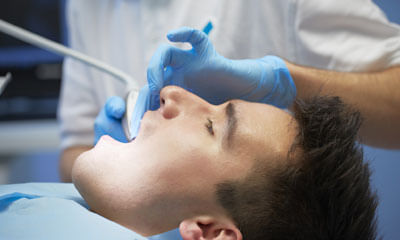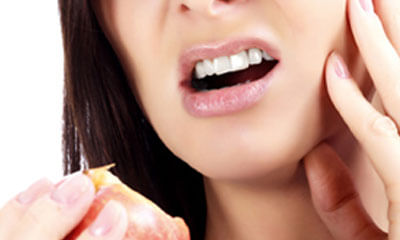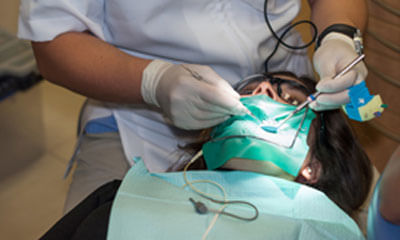Sinus Infection Cause Jaw Pain
My right near and jaw is soring heavily unable to unable to cope up with the serve pain. Seems like someone is knocking ...
Ask Free Question
Hello, This could be coz of cold /ear ache or wisdom tooth decay problem. Visit your nearest dentist first to rule out any dental issue. If no dental problems then ent ppl can help you.
Mere right jaw me pain rahta hai koi kadi chij nahi kha pate bahut pain rahta hai. ...
Ask Free Question
Aapke right jaw mein pain hone ke kai karan ho sakte hain. Kuchh common causes hain: toothache: agar aapke right jaw mein toothache hai, to iska karan kisi tooth mein cavity, abscess, ya fracture ho sakta hai. Temporomandibular joint disorder (tmj): tmj ek condition hai jo jaw joint ko affect karti hai. Ismein jaw mein pain, stiffness, aur locking ho sakta hai. Infection: agar aapke right jaw mein infection hai, to iska karan bacteria, fungus, ya virus ho sakta hai. Sinusitis: sinusitis ek condition hai jo sinuses ko affect karti hai. Ismein jaw mein pain, headache, aur congestion ho sakta hai. Trigeminal neuralgia: trigeminal neuralgia ek condition hai jo trigeminal nerve ko affect karti hai. Ismein jaw mein severe pain ho sakta hai. Agar aapke right jaw mein pain ho raha hai, to iska sabse achcha tarika yeh hai ki aap apne dentist se consult karen. Dentist aapke jaw ko examine karenge aur iska cause pata lagane ki koshish karenge. Yahan kuchh tips hain jo aapko right jaw pain se cope karne mein madad kar sakti hain: ice pack use karein: ice pack jaw mein inflammation ko kam karne mein madad kar sakta hai. Over-the-counter pain relievers lein: ibuprofen ya acetaminophen jaisi pain relievers jaw pain ko kam karne mein madad kar sakti hain. Jaw exercises karein: jaw exercises jaw muscles ko relax karne mein madad kar sakti hain. Agar aapke right jaw mein pain kuchh dino ke baad bhi nahi jata hai, to aapko doctor se consult karna chahiye.
My wife is having severe jaw pain going towards brain on left side and sometimes on right side also. Having headache als ...
Ask Free Question
I understand your concern about your wife's severe jaw pain and headache. However, I cannot provide medical advice or diagnoses as I am not a medical professional. It is crucial to seek immediate medical attention for your wife due to the severity of her symptoms and the potential for serious underlying conditions. Here are some reasons why immediate medical attention is important: the pain radiating to the brain is concerning and could indicate a serious problem like a temporal artery aneurysm, trigeminal neuralgia, or a tumor. Headaches accompanied by jaw pain can also be related to various issues like tmj disorders, sinus infections, or dental problems. Prompt diagnosis and treatment are crucial to prevent potential complications from these conditions. Here are some steps you can take: call emergency services (112 in india) immediately if your wife is experiencing any of the following: difficulty speaking or swallowing numbness or weakness in the face or arms vision changes confusion or dizziness severe neck pain or stiff neck fever or chills if the symptoms are not life-threatening, take your wife to the nearest emergency room or doctor's office as soon as possible. Be prepared to provide the doctor with information about your wife's medical history, current medications, and any other relevant details about her symptoms. Please remember that self-diagnosing or attempting home remedies could be dangerous in this situation. The best course of action is to seek immediate medical attention to ensure your wife receives a proper diagnosis and appropriate treatment. I hope this information helps you take the necessary steps to get your wife the medical care she needs. Please prioritize her health and do not hesitate to seek immediate medical help. I wish your wife a speedy recovery.
There's much infection in my right molar & it was paining continuously so I extracted my molar yesterday. After taking m ...
Ask Free Question
Follow the post extraction advice given by your dentist. After 24 hrs from extraction use warm saline water mouthrinses 3/4 times daily. Continue your medicine accordingly, if given any. If further problem arises report to your dentist. your pain or sensation whatever it is will be fine within 7 days. If not then consult with your doctor. Thanks.
lymph nodes severe pain below the jaw and also ear pain from yesterday. Please suggest how to relieve from pain. ...
Ask Free Question
Ear infection can cause lymph nodes in front of or behind the ears to swell. You might also have ear pain and fever. Ears can become infected when fluid builds up in them. This can happen when you have allergies, a sinus infection, or the common cold. Let's have a detailed discussion to ensure proper treatment.
I am having continuous pain in my lower teeth and especially on inner side. I have yellow teeth with white layer around ...
Ask Free Question
One symptom of a sinus infection is pain in your teeth and in your jaw. As your sinuses become inflamed and filled with pressure from the infection, they can compress the nerve endings of your teeth. Let's have a detailed discussion for better advice and medication plan.
I am having high sensitivity in my right side upper jaw, unable to drink anything or eat from that side. I also feel pre ...
Ask Free Question
Sensitivity in your case can either be due to a diseased tooth or due to a recent sinusitis episode. If you have had a recent history of cold or sinusitis, and if the infection is still present (a small amount of infection not enough to cause symptoms of sinusitis) may be in contact with the root of your tooth/teeth that are in close proximity with the sinus. If this is the case, then taking appropriate antibiotics can relieve you of the pain. It might also be due to a diseased tooth that may have a decay or a crack which may cause the pain. This needs to be assessed by a clinical check-up or a photographic check-up (provided it is clear enough and covers the affected area). Hope I could resolve your query. Feel free to contact me directly via this platform. Have a great day.
Uniform green mucus is coming out of only one of my nostrils and that side is paining from my jaw till my head. I don't ...
Ask Free Question
It's due to infection, may be in sinus there also be infection, take water vapour, take honey in warm water, you need proper homoeopathic treatment to cure your problem permanently.
Hi, I have been chewing gutkha for many years. I am not able to quit it due to severe depression and anxiety. I want to ...
Ask Free Question
Tsm fibro will reverse the symptoms' bt you should stop chewing ghutka completely and immediately. This internal pressure can be due to blocked sinus or infected tooth or muscle spasm. This could be examined physically by your dentist.
Sir, give me reason of hypersalivation and its remedy, kuch din mere mouth me khub sara saliva aya raha hai. Now may kay ...
Ask Free Question
Hypersalivation is not a disease but usually a symptom of another underlying condition. These other factors can range from easily treated and common causes to rare diseases. Saliva is a clear liquid produced by the salivary glands in the mouth. It moistens food and aids swallowing. It also contains enzymes that help with digestion. Saliva can help to heal wounds and remove germs from the mouth, as well as prevent dryness and act as a barrier against irritants and toxins. On average, a healthy person produces between 0.75 and 1.5 liters of saliva each day. Saliva production peaks when a person is eating and is at its lowest during sleep. Too much saliva can cause problems with talking and eating, along with chapped lips and skin infections. Hypersalivation and drooling can also cause social anxiety and diminished self-esteem. Hypersalivation can be the result of: excessive saliva production an inability to effectively swallow or clear saliva from the mouth difficulty keeping the mouth closed Causes of excessive saliva production, leading to hypersalivation, include: morning sickness or nausea during pregnancy sinus, throat, or peritonsillar infections poisonous spider bites, reptile venom, and poisonous mushrooms false teeth ulcers, inflammation, or pain in the mouth poor oral hygiene severe infections such as rabies or tuberculosis severe or sudden pain regurgitation of saliva during heartburn jaw fractures or dislocation Difficulty swallowing or clearing saliva from the mouth can be caused by or associated with some underlying conditions, including Down syndrome, autism, ALS, stroke, and Parkinson's disease. If a person also has a sensory dysfunction, they may not always realize that they are drooling. Causes of an inability to keep the mouth closed, which can result in drooling, include poor neuromuscular control of the muscles around the mouth. Cerebral palsy is an example of such a condition. Difficulty keeping saliva in the mouth can also be due to: poor head and lip control a constantly open mouth impaired tactile sensation an enlarged tongue or poor tongue mobility poor teeth alignment nasal blockage Hypersalivation can also result from non-medical conditions, such as seeing, smelling, or tasting food, or even just thinking about food. It can also be caused by chewing gum or by feelings of excitement and anxiety. Symptoms Symptoms of hypersalivation include drooling, spitting, and excessive swallowing. Other related symptoms include: chapped lips softening and damage to the skin around the mouth infection of the skin around the mouth bad breath dehydration speech disturbance pneumonia poor sense of taste Hypersalivation and drooling may also cause psychological complications and social anxiety, as well impact their ability to eat or speak. People who experience hypersalivation are more likely to inhale saliva, food, or fluids into their lungs, which can lead to aspiration pneumonia. This may happen when the gagging and coughing reflexes are impaired. Diagnosis The aim of diagnosing hypersalivation is to pinpoint the underlying cause and then to recommend the best available treatment for each affected person. A diagnosis is important, as some of the potential causes of hypersalivation have serious complications. To diagnose hypersalivation, a doctor may include an examination of the following: the mouth, teeth, and surrounding skin tongue control, swallowing ability, and jaw stability tonsils and nasal airways alertness and emotional state hydration, hunger, and head posture A doctor will usually consider it necessary to assess other criteria, including: existing medical conditions and ongoing medication how and when hypersalivation occurs the amount of extra saliva produced whether or not the problem is constant or intermittent any adverse effects on daily life Once the cause of hypersalivation is established, a doctor may take the following factors into account when recommending a treatment: severity and complications age and mental status whether hypersalivation is chronic or temporary associated neurological conditions the possibility of improvement Treatment and management Dealing with hypersalivation is about treating the underlying condition that is causing it, as well as managing the immediate effects of excess saliva in the mouth. Depending on the cause, the treatment can include certain types of therapies, medications, and home remedies. In extreme cases, surgery may be considered. Therapy: This can include behavioral modification and speech therapy. People experiencing hypersalivation may benefit from help with posture and head control. They can also learn techniques for lip closure, better tongue control, and swallowing. Medication: The aim of medication for hypersalivation is to reduce salvia production. Anticholinergic medication may be used, although it has a range of side effects, including drowsiness, restlessness, irritability, urinary retention, constipation, and flushing. Treatment can also include a beta-blocker or botulinum toxin (Botox). Home remedies: Drinking plenty of water can reduce saliva production. Tooth-brushing and rinsing with mouthwash can also temporarily dry out the mouth. The successful management of hypersalivation and the resulting drooling can improve a person's confidence and self-esteem. Some causes of hypersalivation may clear up over time without treatment. Such causes include pregnancy, anxiety, and minor injuries. Other causes can pose more serious medical challenges. This category includes neurological causes and nerve disorders. If chronic conditions are the cause, treatment may include lifelong management of a person's hypersalivation.





